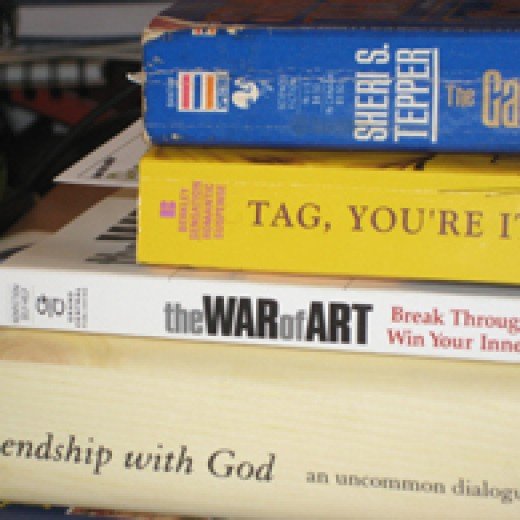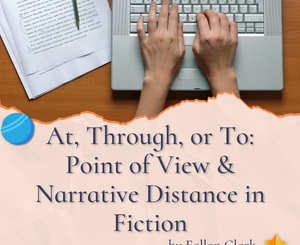Shock Your Writing Back to Life by Wyatt G. Bessing
 Let’s welcome back monthly columnist Wyatt G. Bessing as he shares with us “Shock Your Writing Back to Life.” Enjoy!
Let’s welcome back monthly columnist Wyatt G. Bessing as he shares with us “Shock Your Writing Back to Life.” Enjoy!
***
Does your writing sometimes feel dead? Perhaps your words stare vacantly back at you like lumps on the page? Or do you feel like a lump as you write?
How can you inject passion and danger back into your writing?
Here’s a four-step process for shocking your words to life. Having a method — a system to rely on when the words refuse to come or the mind feels numb and sluggish — is essential. The specific process you choose will, of course, be individual to you. As long as it works for you, all is well.
My Process:
- Write longhand. I love the feeling of pen tip on paper, watching physical marks appear on the page. I love how fast I can write by hand, thoughts pouring out in a river across the page. The river thing is a metaphor, sure, but it’s also an image that deepens my process.
- Type it in. I’ll naturally correct, add, and delete as I go, crafting and shaping the raw words and ideas from Step 1.
- Print and edit. Again, it’s important for me to see the words in three dimensional reality, as a reader would read them in a book. From a reader’s point of view I pore over my manuscript, marking it up, filling in any missing details, crossing out extraneous verbiage and dead end thoughts, sharpening each dull word.
- Type it in a second time. Now the passion of the process starts bubbling again as I rediscover and heighten my original intentions while intermixing the ideas generated as I edited, uncovering new perspectives and honing my expression
But still, sometimes a sentence or phrase might feel dull, a bit banal. So I invented a game to help me rejuvenate my writing. It keeps me excited, waiting in suspense to see what will happen next. Many writers say that at some point in the process of writing a novel their characters come alive, suddenly doing surprising things, taking control of their own destinies on the page. Now your prose can do the same, taking on a life of its own.
To play, grab a six-sided die.
Use the chart below for each number of the die, or create your own:
- Make the first two sounds of neighboring words the same, e.g. “slippery snakes.”
- Transform something into something else: “The rain came down in shimmering diamonds.”
- Long Sentence. Add style and complexity.
- Short Sentence. Add impact and emphasis.
- Compare using like or as. “The raindrops looked like diamonds.”
- Whip out that thesaurus and find a more suitable or evocative word.
Before writing each paragraph of your second draft, roll your die and apply the indicated change as you write. You’ll see your words reanimating, becoming conscious and aware again. If you’re like me this will also deepen your awareness and focus, a good practice in developing your craft.
This is the climactic scene of my short story “Crystal Clear.” I want the reader to understand a shift in the narrator’s point of view here.
I roll a three and consult my revision chart. I’ll place a long sentence within this passage as I edit it.
The new sentence I added is underlined.
“I know my brother! He’s not a snitch!” Angelo says it mattter-of-factly. His hands are trembling like the Glock weighs a hundred pounds.
Sal’s eyes dart back and forth between the combatants, the camera dangling loosely in one hand. For some reason he’s got his necklace with the blue crystal knife pendant off, and he’s holding that in his hand too, chain looped over the cam.
Angelo sniffs. “Move!”
“Don’t you see you’re both right? Don’t you get it?” says Sal, waving the prismatic pendant in the air like a surrender flag, all our faces and guns flashing through it in a million mirrored reflections, “you say it’s over now, Marcus had to die because he snitched out your hideout, but Angelo knows a different Marcus, one who wouldn’t do that, who wasn’t freaked out of his mind, so scared he couldn’t see another way out-”
I look into Angelo’s eyes, then into Fat Man’s, each one frozen still and cold. Listening to Sal, finally just listening. Above us I see a parting in the smog, a thin sliver of night coming through.
I start to stand up with Sal. Just then there’s a blast from a gun far off across the park….
If you’re attempting Nanowrimo this month (and who isn’t?), use this technique as you write. Keep shocking yourself awake and keep your writing moving toward that goal.
May your writing be shockingly good!
***
ABOUT THE AUTHOR
 Wyatt G. Bessing, MFA is a learning specialist, writer, and writing coach. His work has appeared in Outsider Ink, Bedtime-Story.com, national Common Core assessment material, and in the anthology Dance, Human Rights, and Social Justice: Dignity in Motion. By day he helps students in 1st-12th grade develop writing and language skills. In the dark of early mornings and late nights, he steals time to write and teach writing workshops.
Wyatt G. Bessing, MFA is a learning specialist, writer, and writing coach. His work has appeared in Outsider Ink, Bedtime-Story.com, national Common Core assessment material, and in the anthology Dance, Human Rights, and Social Justice: Dignity in Motion. By day he helps students in 1st-12th grade develop writing and language skills. In the dark of early mornings and late nights, he steals time to write and teach writing workshops.Wyatt uses games to motivate his writing. Games are subversive. Seemingly innocent and fun, they create a resting space in the midst of routine, a moment to reflect. Yet they also subvert reality, allowing us to invent new rules and play with the structure of normal thought. Naturally ironic, games allow us to go undercover and investigate normal life from a different vantage point, from a new model that shows how we’ve actually invented the reality we take for granted.






